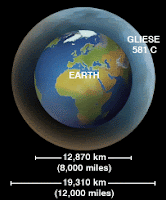 Empty your mind. We’re about to take a BIG leap into the future. Not just a lousy few billions of years, but 10 000 000 000 000 000 000 000 000 000 000 000 000 000 000 000 000 000 000 000 000 000 000 000 000 000 000 000 000 000 000 000 000 000 years!
Empty your mind. We’re about to take a BIG leap into the future. Not just a lousy few billions of years, but 10 000 000 000 000 000 000 000 000 000 000 000 000 000 000 000 000 000 000 000 000 000 000 000 000 000 000 000 000 000 000 000 000 000 years!One ‘googol’ years, is the official word for that number. The problem is that the Universe gets bigger and cooler. Ever since the Big Bang, it expands, much like an expanding ball of fire after an explosion. Right now, the Universe is still young. It has these cute stars and twinkling galaxies. But in the long run, that will change. Slowly but inevitably, the Universe will empty itself.
First, the galaxies will fly out of sight, beyond the horizon of what we can possibly see. Next, the stars in our own galaxy will burn out, one after the other. The only thing that will remain, is a dull graveyard of cold planets, dead suns and black holes. In about one hundred trillion years, the Milky Way will go black, astronomers expect.
And eventually, even this graveyard decays. One after the other, the dead stars and planets are eaten by black holes, or kicked out of the Milky Way by collisions. Astronomers expect that in one hundred to one thousand billion billion years, our galaxy has dissolved completely.
Time goes on. After a while (more trillions of years) something else will kick in. You’ll notice that even the very stuff nature is made of, isn’t stable. A proton, the particle you’ll find in the core of atoms, has an average lifetime of 100 000 000 000 000 000 000 000 000 000 000 000 years. Wait long enough, and it will suddenly vanish. Poof, gone. The same goes for light particles, the so-called ‘photons’. They’re expected to last a few zero’s longer, but in the end, they too will kick the bucket, one after the other. Isn’t that just bizarre? The light will go out, literally.
The last thing that survives, are the black holes. But in the end, they too will vanish. They will evaporate in a puff of radiation.
So there we are, at our unimaginable one googol years. Finally, the Universe is totally and utterly empty. You won’t see any light or spot any planet -- in fact, you won’t even find the tiniest speck of dust. The Universe has sterilized itself. All there is left, is emptiness, and darkness. Total oblivion. And worst of all: there’s nothing we can do to stop it. We can build fancy machines or futuristic devices all we like -- but in the end, they’ll all get kicked out of existence, when the matter they are made of simply vanishes.
So there you have it: infinity. Booooring, we must add.
But don’t sob. There’s an upside.
As the quadrillions of years pass by, something very odd should happen. In eternity, even the rarest events get a chance to occur. Weird, bizarre phenomena that only happen once in a zillion years or so, become quite normal.
For example: the nothingness should yield a few surprises. Already, physicists know that in a vacuum, there is sometimes tiny little energy ‘blobs’. Little, random fluctuations of the so-called ‘quantum vacuum’. Out of nowhere, tiny particles pop in and out of existence. But theory predicts that on very, VERY rare occasions, the fluctuations should be a bit larger. Out of nowhere, an entire atom might appear! Or hey, the vacuum may even spit out a few of them!
Think of it like the static on TV. Wait long enough, and out of the random fuzz, a recognizable image might materialize. Wait REALLY long, and one day a complete episode of The Bold And The Beautiful should accidentally show up!
In the Universe, this should give some really surprising results. With eternity at hand, the vacuum should begin to yield all kinds of objects. Incoherent lumps of random garbage, most of the time. But on very, very rare occasions, you’ll see other objects popping into existence. The Eiffel tower. A purple camel. A golden parking garage filled with chocolate Cadillacs. Napoleon Bonaparte sitting next to Mike Tyson on top of a stack of comic books. As the googols of years pass by, it’s all there.
In the VERY, VERY, VERY long run, the vacuum will even belch up complete planets, and beautiful stars, burning and all. Theoretically the vacuum should even churn out a complete solar system one day, identical to ours, with a planet Earth inhabited by people. "In an infinite amount of time, one day, I will reappear", as physicist Katherine Freese of
One day the black nothingness should even produce a new Big Bang. Admittedly, we’ll have wait really long for it to happen. Researchers of the





